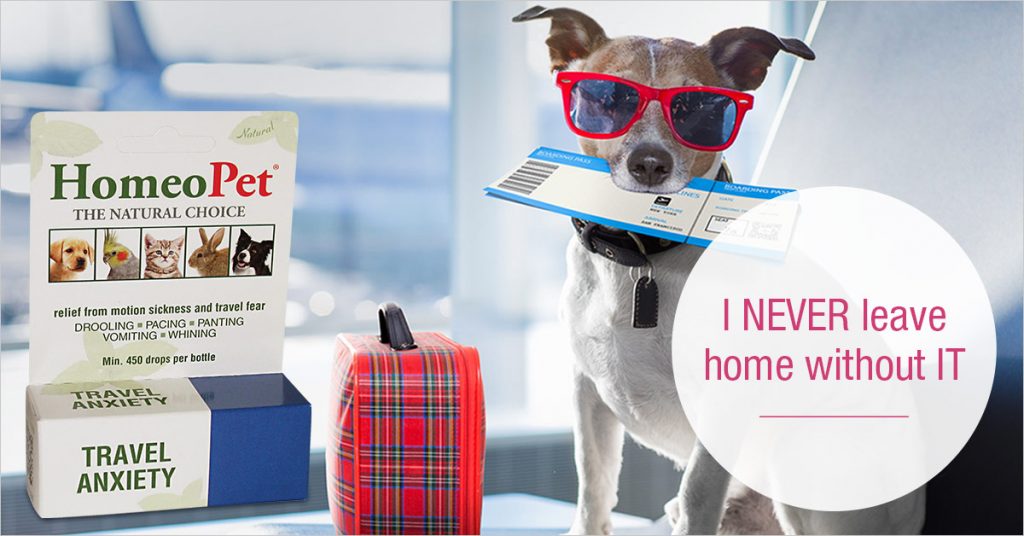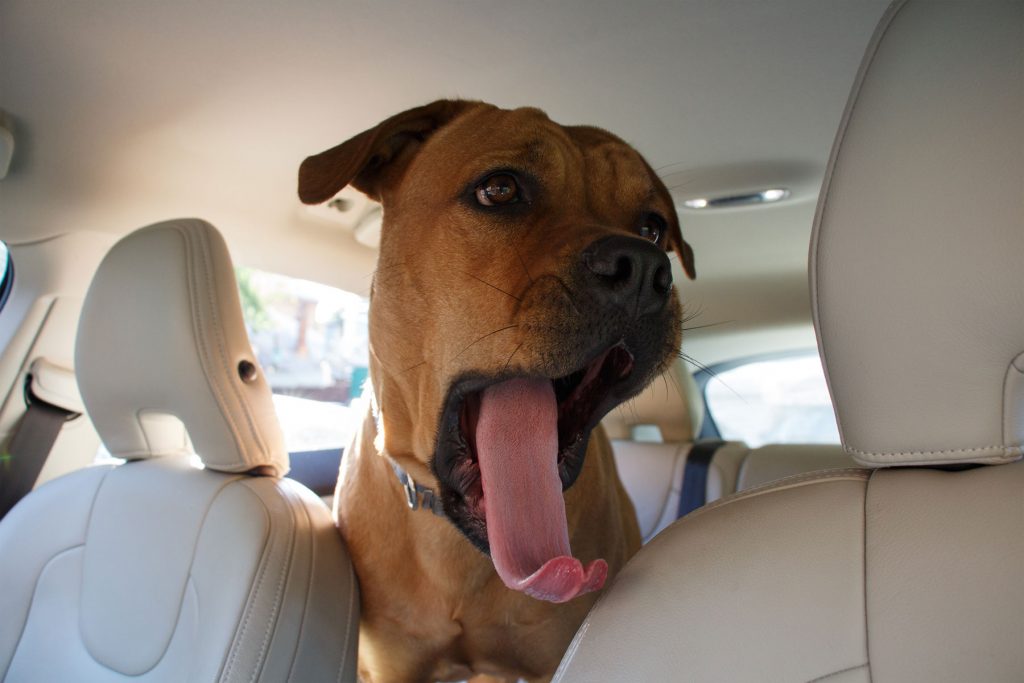No products in the cart.
Behavioral Issues In Pets
Travel Anxiety in pets – how to avoid the stress…and the mess!
It’s a warm, sunny day so you and your dog have hopped in the car and are heading to the park. Suddenly, Fido doesn’t look so good and before you have time to pull in, his breakfast has been decanted unceremoniously all over your back seat.
Pet motion sickness and travel anxiety is an all too familiar story and in extreme cases it can severely limit the experiences that we can enjoy with our dogs. No more hiking weekends away with your four legged friend. No more trips to the beach (unless you’re lucky enough to be within walking distance). Additionally, severe motion sickness and the associated travel anxiety experienced by your dog could make transportation to your vet extremely stressful.
It’s not only dogs that can experience motion sickness and travel anxiety; our cats, rabbits, hamsters and even birds can suffer too. And while we may not be taking our feline friend for jaunts on the shore, there are times when travel in a vehicle is unavoidable and can cause unnecessary stress.
Fortunately, there are some simple things you can do – both for short-term alleviation of motion sickness and longer-term behavioral actions – to help reduce travel anxiety in your pet.
Firstly, what are the symptoms of travel anxiety and motion sickness?
While motion sickness can result in that most noticeable of symptoms – vomiting, there are several other signs that may indicate that your pet is suffering from motion sickness and travel anxiety, all of which are unpleasant for you and your pet.
- Agitation
- Panting
- Excessive salivation
- Trembling
- Barking or mewing
- Whining or scratching
- Urinating or soiling
- Attempting to escape
- Vomiting
What causes travel anxiety and motion sickness in animals?
Dog motion sickness is more common in puppies and young dogs than in older dogs, just as carsickness afflicts more children than adults. This is because the ear structures used for balance aren’t yet fully developed in puppies. Many puppies will outgrow travel sickness as they mature, but not all of them will. If the first few car rides of your puppy’s life left him nauseated, he may have been conditioned to equate travel with vomiting, even after his ears have fully matured.
Your pet’s anxiety may be less about the car itself and more about the destination, as the journey may always end at the vet’s, the groomer’s, or a boarding facility. Or something specific might trigger his or her anxiety, for example the sound the car makes when you drive over rumble strips, or large lorries passing by on the highway.
How do we prevent travel anxiety and car sickness in our pets?
One simple thing to do is keep your pet from looking out the window. This might seem contrary to common sense, as we humans tend to wind down the window to get some fresh air if we are feeling car sick. Depending on the laws around pets in the car in your area, the front foot well of the car is the ideal location. If your pet is travelling in a crate that can fit in this area it’s closest to the lowest point of the car, which moves the least.
It can also help to try a variety of alternative methods to calm your pet. For example, speak to her in a calm, soothing voice, bring her favourite toy along for the ride or you may find that playing some classical music on the radio may help to soothe her nerves.
If your dog suffers from extreme travel anxiety, a longer term behavioural approach may be required. Start with the car parked and go into the back seat (or cargo area) with her, pet her, praise her, and give her treats. Do this for just a few minutes at first, or even just a few seconds (depending on how stressed she is). Do this daily, or every other day, for a couple of week while gradually increasing the amount of time you’re spending in the car.
Once your dog is as comfortable spending a little time in a parked car, the next stage is to take her on a short journey, followed by a reward. Gradually build up the length of journey to desensitise her to the motion and stress of travel and when you feel she is ready, add in a fun destination so she can start to associate the car with going somewhere enjoyable.
While there are conventional pharmaceuticals available, just as there are for humans who experience travel sickness, these should only be used in extreme circumstances and under the direction of your vet, as they can be sedating and have side effects. An easy to use herbal remedy that we find works quite well for motion sickness in dogs is adding a little ginger to their food. Ginger is commonly used in humans to help alleviate motion sickness too, but it’s important not to feed too much or you might just end up with a big clean up job!
Acupressure can also help to alleviate nausea and anxiety. There’s a pressure point located behind and above the carpus – the pet equivalent of the wrist. But it’s essential to receive expert advice from a pet care professional to ensure this is done correctly and without stress to your pet.
Another safe and effective way to help alleviate motion sickness and fear of travel is HomeoPet’s Travel Anxiety medicine. These simple to administer liquid drops are non-sedating and contain only safe ingredients with no side effects.
Travel Anxiety has a broad-spectrum formulation that addresses the many underlying causes of travel sickness, both the physiological and the psychological. The drops are fast-acting, can be used on an “as needed” basis for travelling short or long distances and are safe to use for any pet regardless of their general health or other medications they may be taking. Consequently, you can confidently administer the drops and get some relief for your pet from fear of travel or motion sickness at any stage of his or her life.
HomeoPet’s Travel Anxiety contains a unique blend of effective homeopathic ingredients, including Borate of Sodium – a pre-eminent medicine that helps to reduce the startling effect of sudden noises, Meadow Saffron – to help alleviate motion sickness, Valerian Root which has a calming effect on the over-excitement associated with travel, Cocculus indicus for the effects of motion sickness from a disturbance of the balance mechanism and Passion Flower which helps calm fear induced by the effects of traveling.
If you have any questions on coping with Travel Anxiety in your pet and how Homeopathy and the HomeoPet range could help, please do get in touch. Our team of trained pet care staff are on hand to answer your questions.






